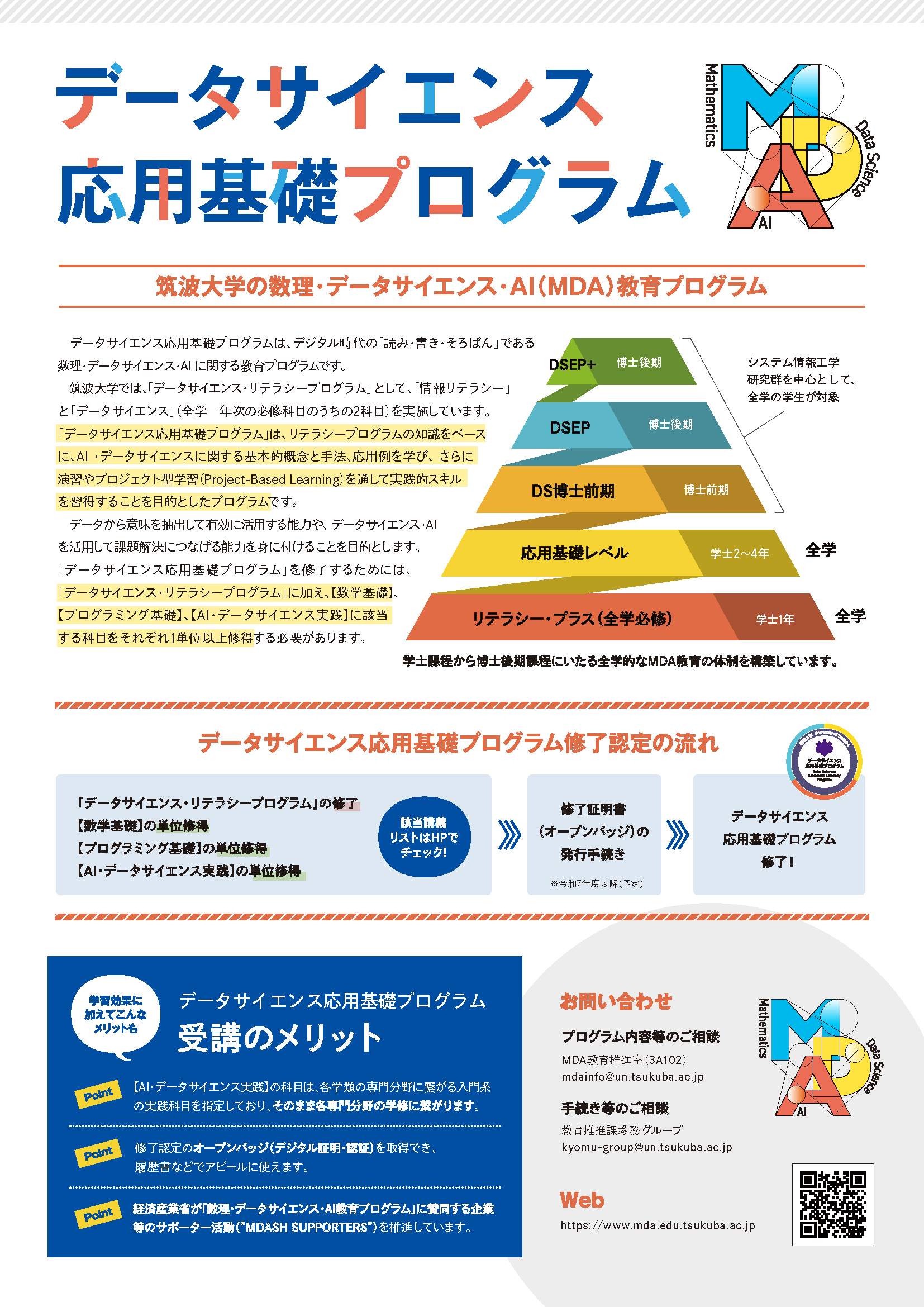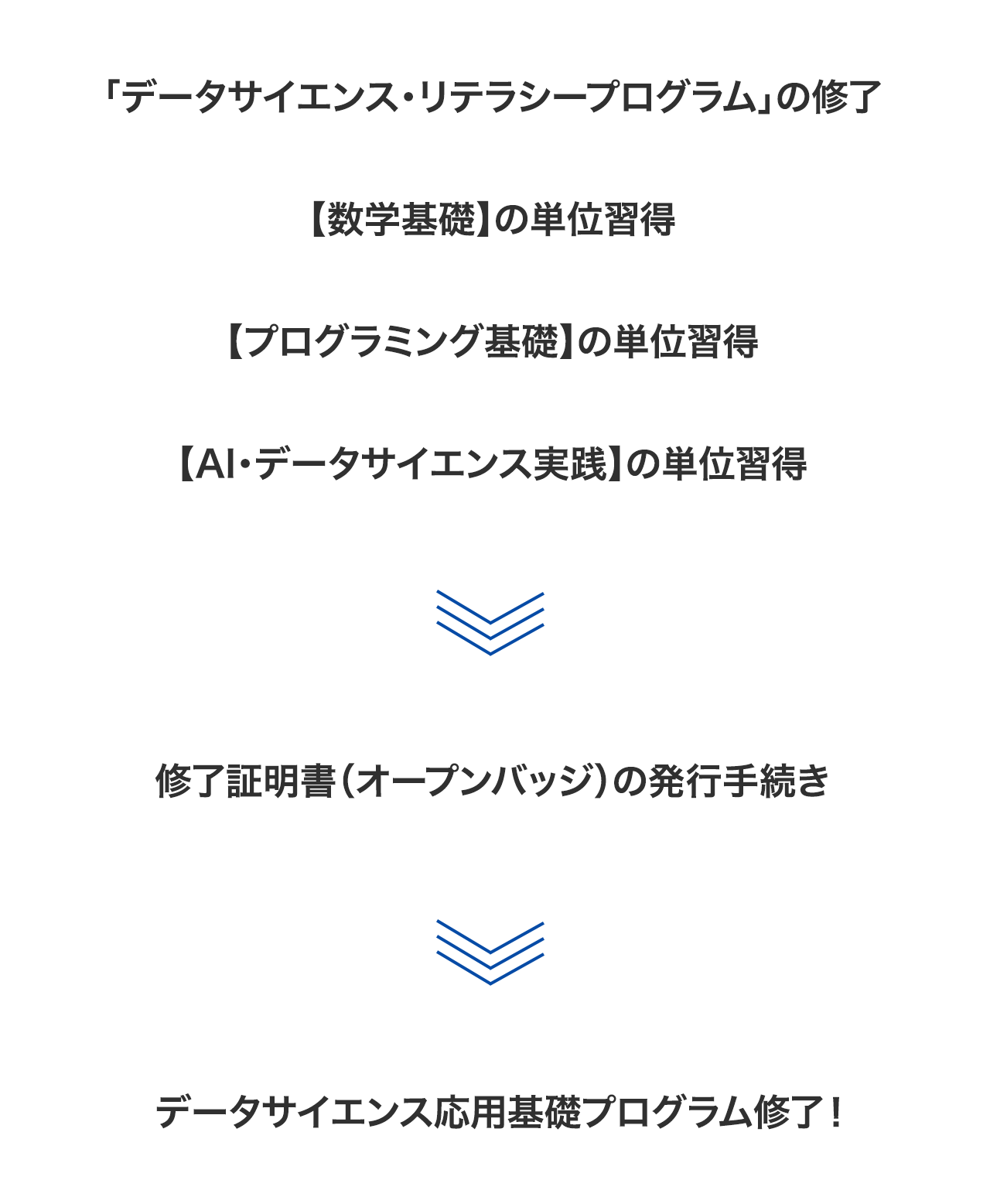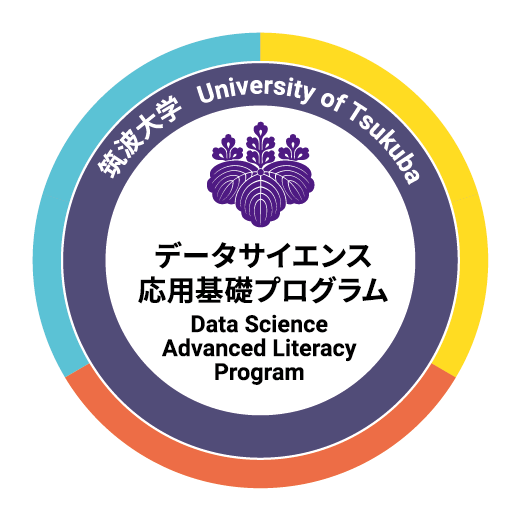
Undergraduate Education
Data Science
Advanced Literacy Program
The University of Tsukuba launched the Data Science Advanced Literacy Program for all of its schools and colleges in April 2024. This program is an educational program that offers a certificate of completion with an open badge, which can be obtained upon completion of the requirements. This program consists of university-wide common subjects and subjects for each school and college, and is open to all students affiliated with the University of Tsukuba.
The program is also designed to serve as an important conduit for students at the literacy level to become experts and even leaders in their fields of expertise. This program is a program with the objective of learning basic concepts, methods, and applications related to mathematics, data science, and AI based on the knowledge of the Literacy Program, as well as acquiring practical skills through exercises and project-based learning (PBL). The program aims to help students acquire the ability to extract meaning from data and make effective use of it, as well as the ability to use data science and AI to solve problems.
To complete the Data Science Advanced Literacy Program, in addition to the Data Science Literacy Program, students must earn at least one credit from Fundamentals of Mathematics, Basics of Programming, and Practices of AI and Data Science.

Abilities that can be acquired
through this program
By completing this program, students will learn basic concepts, methods, and applications of mathematics, data science, and AI (MDA), and acquire practical skills through practical exercises and PBL. This enables students to acquire the ability to extract meaning from data and use it effectively, as well as the ability to apply it appropriately to solve real-world problems.
Completion Requirements and Courses
Outline of the process for completion certification



該当講義リスト(2024年度)
| 数学基礎 | 実践入門!AI・データサイエンス~基礎と展開~ (※学士基盤科目) Mathematical Economics(社会・国際学群) 経済数学(社会学類) 応用数学(国際総合学類) 数理科学II(国際総合学類) データ解析(国際総合学類) 実用解析I(生物資源学類) 地球基礎数学・物理学(地球学類) 数学リテラシー1(理工学群) 線形代数1(理工学群) 線形代数I(数学類) 線形代数A(情報学群) |
| プログラミング基礎 | 実践入門!AI・データサイエンス~基礎と展開~ (※学士基盤科目) 実証分析入門(社会学類) 情報科学II(国際総合学類) 情報科学I(国際総合学類) 心理学統計法II(心理学類) 数理科学演習(生物資源学類) 大気科学実験B(地球学類) 地球情報学(地球学類) 計算機演習(数学類) 計算物理学II(物理学類) 応用理工学情報処理(応用理工学類) プログラミング入門A(社会工学類) プログラミング入門A(情報学群) プロトタイピング(芸術専門学群) プログラミング基礎(芸術専門学群) プログラミング応用(芸術専門学群) デザイン解析論:データサイエンスと統計解析(芸術専門学群) |
| AI・データサイエンス実践 | 人文情報学(人文・文化学群) 日本語学演習I-a(人文学類) 日本語学演習I-b(人文学類) 文化学データ演習I(比較文化学類) 文化学データ演習II(比較文化学類) 文化地理学実験実習II(比較文化学類) 日本語の談話演習(日本語・日本文化学類) 日本語コーパス分析(日本語・日本文化学類) 日本語コーパス分析演習(日本語・日本文化学類) 実証分析入門(社会学類) 公共政策分析(国際総合学類) 人工生命概論(国際総合学類) データ解析(国際総合学類) 地理情報システム概論(国際総合学類) 社会科学のためのデータサイエンス(国際総合学類) 計量経済学(国際総合学類) 数理科学II(国際総合学類) 情報科学I(国際総合学類) 応用数学(国際総合学類) 心理学統計法実習(心理学類) 心理学統計法II(心理学類) 心理学上級(計量心理学)(心理学類) 心理データ解析(心理学類) 社会福祉調査論(障害科学類) 基礎数学(生物資源学類) 流域計測工学(生物資源学類) 生物資源科学情報処理実習(生物資源学類) 農林生物学基礎実験(生物資源学類) 環境工学基礎実験(生物資源学類) 統計学基礎演習(生物資源学類) 環境動態解析学実験(地球学類) 地球統計学(地球学類) 地学実験(地球学類) 地球学実験(地球学類) 大気科学野外実験(地球学類) 人文地理学・地誌学実験B(地球学類) 地理情報システム(GIS)(地球学類) 大気科学実験A(地球学類) 統計学演習(数学類) 統計学(数学類、社会工学類) 物理学実験I(物理学類) 計算物理学I(物理学類) 計算物理学III(物理学類) 分子構造解析(化学類) 計算化学(化学類) 分析化学(化学類) 応用理工物理学実験(応用理工学類) 計算機実習(応用理工学類) コンテンツ表現工学(工学システム学類) コンテンツ工学システム(工学システム学類) 巨大プロジェクトエンジニア入門(工学システム学類) 都市数理(社会工学類) 社会と最適化(社会工学類) 経済学の実証(社会工学類) 社会工学演習(社会工学類) 都市計画演習(社会工学類) ビジネスシステムデザイン基礎II(情報学群) ビジネスシステムデザイン実践II(情報学群) 知能情報メディア実験A(情報科学類) 知能情報メディア実験B(情報科学類) ソフトウェアサイエンス実験A(情報科学類) ソフトウェアサイエンス実験B(情報科学類) 情報システム実験A(情報科学類) 情報システム実験B(情報科学類) 情報メディア実験A(情報メディア創成学類) 情報メディア実験B(情報メディア創成学類) 医学統計学(医学類) 公衆衛生看護学応用論(看護学類) 看護学探究演習(看護学類) 生化学成分検査学実習(医療科学類) 体育心理学演習I(体育専門学群) 保健体育科(体力づくり運動)指導法(体育専門学群) 体育心理学演習III(体育専門学群) 感性情報とメディアインタラクション演習(芸術専門学群) デザイン解析論:データサイエンスと統計解析(芸術専門学群) Practical Traininig on Global Issues B-I(地球規模課題学位プログラム) Practical Training on Global Issues A-II(地球規模課題学位プログラム) Practical Training on Global Issues B-II(地球規模課題学位プログラム) |
Course Details
This program consists of three applied basic cores. The curriculum included in each applied basic core corresponds to the Model Curriculum for Mathematics, Data Science and AI (Advanced Literacy Level), and is covered by the class subjects listed above.
Advanced Literacy Core: I. Data Representation and Algorithms
- 1-6. Fundamentals of Mathematics
- 1-7. Algorithms
- 2-2. Data Representation
- 2-7. Basics of Programming
Advanced Literacy Core: II. Basics of AI and Data Science
- 1-1. Data-driven Society and Data Science
- 1-2. Analytical Design
- 2-1. Big Data and Data Engineering
- 3-1. History and Applications of AI
- 3-2. AI and Society
- 3-3. Fundamentals and Outlook of Machine Learning
- 3-4. Fundamentals and Outlook of Deep Learning
- 3-9. Construction and Operation of AI
Advanced Literacy Core: III. Practices of AI and Data Science
- Basics of Data Engineering
- Planning, Implementation and Assessment of Data and AI Utilization
Self-inspection and Evaluation System
System for improving and advancing the program
The Curriculum Committee will discuss and coordinate the following matters in order to improve and advance this program*1.
- Establishment of academic courses to be included in the Advanced Literacy
- Self-inspection for each academic year
- Publicity to students (mainly new students)
- Issue certificates to those who have completed the Advanced Literacy*2
*1 Headquarters for Interdisciplinary Education on Mathematics-Data Science-AI members will participate in the Curriculum Committee to build an effective implementation system.
*2 Scheduled to be implemented from the 2025 academic year onward.
System for self-inspection and evaluation of the program
The Headquarters for Interdisciplinary Education on Mathematics-Data Science-AI will evaluate the self-inspection results of this program.
